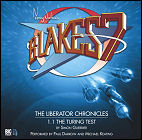 The Liberator follows the tenuous trail of a group of brilliant scientists shipped off to a rogue planet by the Federation. Avon, suspecting that the “exiled” geniuses are top cyberneticists, concocts a plan to infiltrate their ranks. Vila poses as a rogue digital memory expert, while the ever-impassive Avon finds it easier to pass as Vila’s creation: a sentient android. The double-act ingratiates them with the isolated scientists enough for Vila and Avon to meet their creation: a real android simply named 14. Poised on the edge of attaining sentience herself, 14 represents a technology that the Liberator crew can’t allow to be put into use by the Federation. When the distant science outpost is attacked by pirates, however, Avon realizes why 14 is named 14: her predecessors, all marvels of technology, have become cannon fodder to protect their creators. At that moment, Avon succumbs to an unusual, Blake-like urge to set the android free.
The Liberator follows the tenuous trail of a group of brilliant scientists shipped off to a rogue planet by the Federation. Avon, suspecting that the “exiled” geniuses are top cyberneticists, concocts a plan to infiltrate their ranks. Vila poses as a rogue digital memory expert, while the ever-impassive Avon finds it easier to pass as Vila’s creation: a sentient android. The double-act ingratiates them with the isolated scientists enough for Vila and Avon to meet their creation: a real android simply named 14. Poised on the edge of attaining sentience herself, 14 represents a technology that the Liberator crew can’t allow to be put into use by the Federation. When the distant science outpost is attacked by pirates, however, Avon realizes why 14 is named 14: her predecessors, all marvels of technology, have become cannon fodder to protect their creators. At that moment, Avon succumbs to an unusual, Blake-like urge to set the android free.
written by Simon Guerrier
directed by Lisa Bowerman
music by Alistair LockCast: Paul Darrow (Avon), Michael Keating (Vila)
Notes: This is one of the three stories comprising the first Liberator Chronicles box set produced by Big Finish Productions, marking the first new classic series audio stories since the two BBC-produced radio plays in 1999. In much the same format as Big Finish’s Doctor Who Companion Chronicles, only two cast members are featured, with Darrow recounting the story from Avon’s perspective and occasionally performing dialogue scenes between Avon and Vila with Keating. All three stories take place between the first season episodes Project Avalon and Breakdown.
LogBook entry and TheatEar review by Earl Green
Review: Big Finish should’ve gotten the Blake’s 7 license a long time ago.
The one thing that kept them from doing that, however, was B7 Enterprises, the company formed by Andrew Mark Sewell, the producer who bought the rights to Blake’s 7 from the estate of series creator Terry Nation with an eye on reinventing it for a 21st century audience. As is generally well-known (and recounted by Paul “Avon” Darrow in his own autobiography), Sewell’s original plan fell through and Darrow eventually severed ties with the franchise that was depending on him to tie the new project into the old. After a somewhat schizophrenic relaunch of Blake’s 7 as a “reimagined” audio series with two parallel strands – a “current” story rebooting the universe and a series of “Early Years” releases chronicling the reimagined characters’ new backstories – B7E put its audio franchise on hold to pursue a TV deal with Sky One, a deal that eventually fell through.
B7E and Big Finish finally worked out a deal: B7E still reserves the option to continue its full-cast audio dramas with its all-new cast in the “reimagined” Blake’s 7 universe (which, don’t get me wrong, does have its charms), while Big Finish gets to play in the universe of the original series via the Liberator Chronicles, audiobooks-with-two-hander-play-elements patterned after the Doctor Who Companion Chronicles. Delightfully, most of the Liberator Chronicles released or announced to date pair two of the regulars from Blake’s 7 together, because they tended to pair off into potent double-acts with brilliant dialogue.
That’s really the potential strength of the Liberator Chronicles. Blake’s 7 never got by on eye-popping effects: it wasn’t even graced with a Doctor-Who-sized budget in its late ’70s/early ’80s TV run on the BBC. The characters and the scripts, however, made the show engrossing, not just endearing. The performances, though occasionally hammy-going-on-campy, sealed the deal: the right actors playing the right roles went a long way. When Avon had Servalan backed up against the wall of an “ancient” wine cellar at gunpoint, who gave a damn if that wall was a bit wobbly?
Sadly, the “narrated” nature of the Liberator Chronicles rob the stories of some of that shine. Blake’s 7 a la Big Finish needs to be a full-cast extravaganza similar to the main Doctor Who audio range. Doing so would present a few problems: some of the actors have died, which would require some elaborate dancing to cover their absence. But doing so would also enable us to have more sparkling dialogue. The Turing Test skates by on the strength of a glimpse into Avon’s head, but the Avon-Vila dialogue, while authentic and frequently funny, is all too infrequent. The selling point of doing anything that bolts new chapters onto classic Blake’s 7 is that we get to hear these actors again – and really, I’d rather hear them acting than reading.
